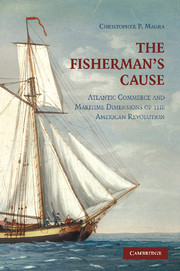Book contents
- Frontmatter
- Contents
- Acknowledgments
- Abbreviations
- Introduction
- Part One THE RISE OF THE COLONIAL COD FISHERIES
- Part Two ATLANTIC ORIGINS OF THE AMERICAN REVOLUTIONARY WAR
- 4 Cod and the Atlantic Economy
- 5 Atlantic Business Competition and the Political Economy of Cod: Part One
- 6 Atlantic Business Competition and the Political Economy of Cod: Part Two
- 7 The New England Trade and Fisheries Act
- Part Three THE MILITARY MOBILIZATION OF THE FISHING INDUSTRY
- Index
- References
5 - Atlantic Business Competition and the Political Economy of Cod: Part One
Published online by Cambridge University Press: 03 July 2009
- Frontmatter
- Contents
- Acknowledgments
- Abbreviations
- Introduction
- Part One THE RISE OF THE COLONIAL COD FISHERIES
- Part Two ATLANTIC ORIGINS OF THE AMERICAN REVOLUTIONARY WAR
- 4 Cod and the Atlantic Economy
- 5 Atlantic Business Competition and the Political Economy of Cod: Part One
- 6 Atlantic Business Competition and the Political Economy of Cod: Part Two
- 7 The New England Trade and Fisheries Act
- Part Three THE MILITARY MOBILIZATION OF THE FISHING INDUSTRY
- Index
- References
Summary
Following the Sugar Act's passage in 1764, a colonial pamphleteer appealed to Parliament “to point out the method of reconciling the present seemingly different and clashing interests of its southern [i.e. West Indian] and northern [i.e. New England] colonies.…That the northern colonies (in which the operation of the said act was chiefly to take place) will be extremely prejudiced in their general navigation, fishery and commerce, is so very obvious.”
Edward Payne was more than a little anxious in 1763. He was a fish merchant who lived in Boston. He owned wharfspace, vessels, and a flakeyard in Gloucester, Massachusetts, most likely due to the expense and overcrowding associated with Boston's busy harbor. Payne proudly remarked that his “Own Vessels caught more Fish than the generality of the Vessels in that Town did.” He was also a leading member of the “Society for Encouraging Trade and Commerce within the Province of the Massachusetts Bay,” a Boston-based merchant consortium devoted to promoting colonial businesses through paid political lobbyists. In this capacity, he had “procured from all the principal Fishing Towns in this Province as exact an account as could be taken of the number of Vessels employed in the Fishery in this Province.” This information included how much fish had been caught on an annual basis in Massachusetts; the type of fish that was able to be cured (merchantable or refuse grade); and where the fish was sold.
- Type
- Chapter
- Information
- The Fisherman's CauseAtlantic Commerce and Maritime Dimensions of the American Revolution, pp. 99 - 126Publisher: Cambridge University PressPrint publication year: 2009



